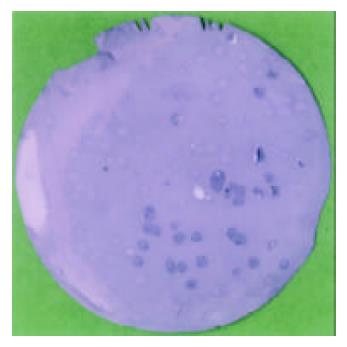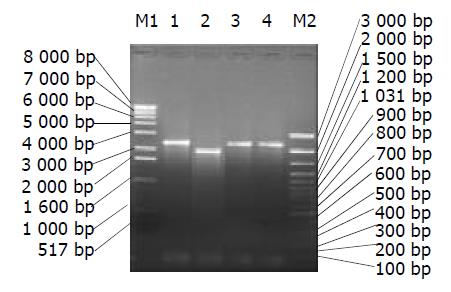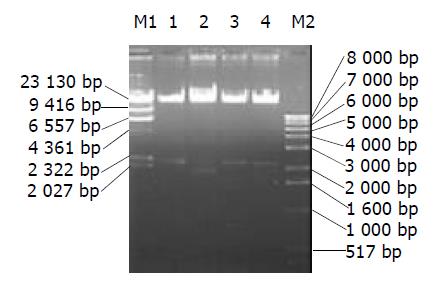修回日期: 2002-12-18
接受日期: 2002-12-25
在线出版日期: 2003-09-15
寻找人源性大肠癌相关抗原基因.
构建3个以λTripl Ex2噬菌体作载体的大肠癌抗原cDNA表达文库, 用自体或异体大肠癌患者血清应用SEREX方法进行免疫筛选. 用平板法扩增阳性克隆噬菌体, 提取纯化DNA, 用Sfi I 酶切和PCR鉴定插入片段的大小.
构建成3个大肠癌抗原cDNA噬菌体表达文库, 滴度分别为2.39×106 nfu/L, 2.07×106 nfu/L和1.86×106 nfu/L, 插入片段长度为0.5-4 kb, 平均分别为1.4 kb, 1.6 kb和1.3 kb. 筛选发现4个阳性克隆, 插入cDNA片段大小分别为 2.4 kb, 1.8 kb, 2.3 kb和2.2 kb.
用SEREX方法筛选大肠癌抗原cDNA表达文库, 可获得有价值的大肠癌的重组抗原基因克隆, 将有利于大肠癌的早期诊断和重组疫苗的研究.
引文著录: 刘宇虎, 张振书, 钟东, 武金宝, 但汉雷, 赖卓胜, 王亚东, 张亚历, 肖冰. 人源性大肠癌抗原基因的SEREX筛选. 世界华人消化杂志 2003; 11(9): 1378-1381
Revised: December 18, 2002
Accepted: December 25, 2002
Published online: September 15, 2003
To screen and identify the human colorectal carcinoma associated antigen genes.
Three human colorectal carcinoma cDNA phage expression libraries were constructed. They were screened from autologous and allogeneic sera of colorectal cancer patients by SEREX (serological identification of antigens by recombinant expression cloning). The sera were pre-absorbed by the extract E. coli XL1-blue. Four different serum-reactive cDNA clones were isolated by immunoscreening from a colon cancer-derived cDNA expression library. Positive clones were amplified by plate culture, the purified lambda phage DNA was cut by Sfi I restriction endonucleases and amplified with PCR in order to identify the insert size of cDNA by electrophresis.
Three cDNA phage expression libraries were constructed. The titer of library was 2.39×106 nfu/L, 2.07×106 nfu/L and 1.86×106 nfu/L respectively, The range of the fragment length of exogenously inserted cDNA was between 0.5-4 kb, the average was 1.4 kb, 1.6 kb and 1.3 kb, respectively. Four gene clones were obtained by SEREX screening, the length of their insert fragments was 2.4 kb, 1.8 kb, 2.3 kb and 2.2 kb, respectively.
To screen and identify human colorectal carcinoma cDNA phage expression libraries by SEREX is a useful method to search for human colorectal carcinoma associated antigen genes. It is important for early diagnosis and research of recombinant vaccine for colorectal cancer.
- Citation: Liu YH, Zhang ZS, Zhong D, Wu JB, Dan HL, Lai ZS, Wang YD, Zhang YL, Xiao B. Screening of human colorectal carcinoma associated antigen genes by SEREX. Shijie Huaren Xiaohua Zazhi 2003; 11(9): 1378-1381
- URL: https://www.wjgnet.com/1009-3079/full/v11/i9/1378.htm
- DOI: https://dx.doi.org/10.11569/wcjd.v11.i9.1378
cDNA文库的应用, 为分离肿瘤抗原基因奠定了基础. 重组克隆表达抗原的血清学鉴定技术(serological identification of antigen by recombinant cDNA expression libraries. SEREX)可直接鉴定肿瘤抗原. 不需要特异CTL和瘤细胞的体外建株, 应用cDNA表达文库使抗原浓度成百倍的增加, 解决了既往肿瘤抗原抗体反应中的关键问题, 发现了大量的肿瘤抗原. 我们用SEREX方法筛选人源性大肠癌cDNA噬菌体表达文库, 期能发现新的大肠癌相关基因.
南方医院普外科大肠癌患者手术的新鲜癌组织3例; 大肠杆菌E.coli XL1-blue 和噬菌体载体λTriplEx2购自Clontech公司; Trizol试剂购自Gibco公司; SMARTTM cDNA library on struction kit购自Clontech; ExpandTM reverse transcriptase购自宝灵曼公司; MaxPlaxTM packaging extract kit购自Epicentre公司; 硝酸纤维素膜(NC膜)购自Pall Corp; 碱性磷酸酶标记的羊抗人IgG抗体为Southern Biotechnology Associates, Inc; BCIP和NBT购自BBI公司; EX TagTM extrue酶购自TaKaRa; Sfi I酶购自NEB; 琼脂糖购自Gibco; 1 kb DNA ladder marker 购自NEB; 100 bp DNA ladder marker 购自MBI; Lambda DNA/ Hind III marker 购自Promega; Orbital shaker incubator RKC CB700 摇床; Shaking bath SB-16 Techne摇床; UNO II Biometra 960型PCR仪; Sigma 3K-30 台式冷冻高速离心机; Vilber Lourmat 凝胶图像分析仪.
1.2 方法 用Trizol LS reagent试剂裂解组织并提取总RNA, 用RT-PCR合成cDNA第1链, 用LD-PCR合成cDNA第2链, 在蛋白酶K消化, Sfi I酶切后, 用Chroma Spin-400分离弃除小于500bp的小片段, 与λTriplEx2噬菌体载体连接, 体外包装, 构建成大肠癌抗原噬菌体cDNA表达文库. 取1支50 mL培养管, 加入15 mL含硫酸镁的 LB, 加入四环素终浓度为15 mg/L. 挑选1个单个孤立的E.coli XL1-blue菌落加入, 37 °C, 200 r/min摇床孵育6-8 h至A600=2.0. 取0.5-1 mL菌液加入另1支有15 mL含硫酸镁、麦芽糖和四环素的LB 50 mL培养管, 37 °C, 200 r/min摇床孵育4-6h至对数生长期A600=0.6-0.8. 5 000 r/min, 离心10 min, 弃上清, 用10 mmoL 硫酸镁7.5 mL重悬细菌沉淀, 制备成感受态菌液, 4 °C冰箱存放. 按1:200接种于含硫酸镁、四环素的1 000 mL LB中, 37 °C, 200 r/min振摇生长至饱和. 4 °C, 4 000 r/min, 离心10 min, 沉淀细胞重悬于10 mL PBS中, 经超声粉碎制成E.coli XL1-blue裂解液. 每1 mL血清加 8 mL裂解液, 于4 °C摇床50 r/min振摇过夜. 4 °C, 4 000 r/min, 离心10 min, 收集上清. 再用同样方法、同等量裂解液重复吸收3次, 制成血清预吸收液, 4 °C冰箱存放. 取文库1 mL加入感受态菌液 200 mL, 37 °C 孵育15 min, 使噬菌体黏附于细菌. 加入3 mL 溶化冷却到48 °C的含硫酸镁的LB顶层软琼脂, 混匀, 倒入预热到 37 °C底层硬琼脂 90 mm平板中, 迅速涡旋铺平. 室温冷却10 min, 正立37 °C 孵育30 min, 倒置37 °C 孵育12-18 h. 见噬菌斑生长如针尖大小, 用平头镊将预先高压灭菌, 用20 mmol/L IPTG浸泡4 h, 室温自然干燥的NC膜平铺于于平皿上, NC膜边缘不对称标记, 贴膜后42 °C 诱导4 h, 以使转移到NC膜的噬菌斑能充分诱导其融合蛋白形成. 小心将NC膜从平板上剥离取出, 放于湿润的纸巾上, 旁边放一装有氯仿的无盖平皿, 用一塑料罩将NC膜和平皿罩住15-20 min, 以固定NC膜. 平皿4 °C 保存, 以备挑出阳性克隆. 将NC膜迅速浸泡于大量1碩NT缓冲液中, 室温轻摇, 洗涤3次, 每次10 min, 以去除残存的琼脂. 将NC膜置于20 mL用TBST配制的100 g/L脱脂奶粉的封闭液中, 室温轻摇90 min. 1碩NT缓冲液洗涤3次, 每次10 min. 将NC膜移入用PBS 1:50或1:100稀释的已预吸收的大肠癌患者血清中, 4 °C轻摇过夜. 1碩NT缓冲液洗涤3次, 每次10 min. 将NC膜置于1:800稀释的碱性磷酸酶标记的羊抗人IgG抗体中, 室温轻摇60 min. 1碞T缓冲液洗涤3次, 每次10 min. 凉干后, 置于含NBT 33 mL和BCIP 16.5 mL的碱性磷酸酶缓冲液中, 显色30 min. 阳性克隆进行第二轮和第三轮筛选. 阳性克隆采用平板法扩增噬菌体, 用消毒牙签挑选阳性噬斑, 置于装有1 mL 1碙.D.B溶液(噬菌体稀释液)的1.5 mL EP管内, 加入25 mL氯仿, 涡旋2 min, 于4 °C放置过夜. 取50-100 mL噬菌体悬液加入 500 mL感受态菌液, 用 150 mm平板扩增噬菌体, 37 °C孵育12-18 h或到噬斑相互融合止. 加入12 mL不含明胶的1碙.D.B, 4 °C过夜. 平板室温, 50 r/min摇床1 h. 收集洗涤液到另一支50 ml离心管中. 用Qiagen公司试剂盒提取、纯化阳性克隆噬菌体DNA, 最后用50 mL pH8.0的TE溶解. 用NEB公司的Sfi I酶切50 °C 2 h. 用TaKaRa公司的EX TagTM extrue 做PCR, 上游引物: 5'-TCCGAGATCTGGACGAGC-3'下游引物: 5'-CCCTATAGTGAGTCGTATTA-3'条件: 94°C 30 s, 58°C 60 s, 72 °C 2min, 35循环. 用10 g/L琼脂糖凝胶, 1碩AE缓冲液, 60 V, 60 min电泳, 观察片段的大小.
成功构建成3个大肠癌抗原cDNA噬菌体表达文库, 滴度分别为2.39106 nfu/L, 2.07106 nfu/Ll和1.86106 nfu/L. 重组率分别为97.5 %, 98.6 %和98.5 %. 插入外源cDNA片段大小范围从0.5-4 kb, 平均分别为1.4 kb, 1.6 kb和1.3 kb. 合符建库要求, 适合于大批量筛选cDNA克隆的大肠癌特异或相关抗原基因.
2.2 筛选阳性克隆 噬菌斑转移到NC膜上, 经显色反应后, 背景呈浅紫色, 阴性噬菌斑与背景相似, 有淡的噬菌斑影, 阳性的噬菌斑呈深蓝色. 图1为NC膜上复筛的阳性克隆.
目前国内研究大肠癌基因表达较多[1-26], 而很少有人构建大肠癌抗原基因cDNA表达文库[27] 以寻找大肠癌相关基因. 用血清免疫学方法筛选cDNA文库(SEREX)是近来发现的获取特异性基因克隆的分子生物学技术, 是应用于重组疫苗和诊断抗原研究的一种有效方法. 应用SEREX技术在大肠癌已发现较多新基因. Scanlan et al [28]发现48个抗原NY-CO-1-NY-CO-48, 17个为新基因, NY-CO-13为p53肿瘤抑制基因的突变体, NY-CO-27主要在胃肠道表达, 为组织特异性的亚型, 有半数患者的血清发生反应. Hampton et al [29]发现2个癌基因专宿白血病病毒包膜蛋白(env)抗原和鼠ATRX蛋白抗原, env代表2个未突变的肿瘤抗原, 其DNA多核苷酸编码的env多肽在小鼠体内引起强烈而特异的免疫反应. Line et al [30]发现5个基因, RHAMM和AD034基因有不同的组织表达. NAP1L1, RHAMM和AD034基因只在肿瘤组织中表达. AD034的序列与酪氨酸激酶的基序移码插入32 bp的位点是肿瘤分化的cDNA隐含的剪接位点. RHAMM cDNA序列有2个剪接变异, 有2个亚细胞位点. 多数患者的血清对C21ORF2、EPRS和NAP1L1有反应. Somers et al [31]发现13抗原基因, 1个新基因, 与HSPC218同源, 可作为肿瘤疫苗候选基因及诊断与预后的标记物.
肿瘤抗原的鉴定不仅有助于阐明肿瘤免疫分子机制, 也是建立新的肿瘤免疫学诊断和防治方法的基础. 大多数人类肿瘤可表达若干种具有免疫原性的蛋白质, 但只有那些具有特异性或有一定优势的抗原(如CT抗原)可用于制备疫苗. 选择在组织限制性mRNA表达和肿瘤限制性免疫原性两个方面最有意义的抗原做进一步的研究. 由于肿瘤抗原同时存在特异性的体液免疫和细胞免疫, 其所揭示的T细胞和B细胞双识别肿瘤抗原现象, 广泛存在于肿瘤患者中. 用肿瘤特异的T淋巴细胞识别肿瘤抗原的多肽, 产生多价疫苗, 是肿瘤基因疫苗的一个策略. Okada et al [32] 进行肿瘤疫苗治疗的结果表明, 临床有望开展肿瘤的疫苗治疗. SEREX所鉴定的肿瘤抗原除可作为制备肿瘤疫苗的对象外, 还可作为大范围人群血清学调查, 肿瘤临床诊断以及肿瘤疫苗临床疗效监测的指标. 对大肠癌抗原基因的筛选, 对阳性克隆进一步做序列分析和生物活性鉴定, 可望对大肠癌的病因学、诊断、治疗有突破性的进展.
| 1. | Zhou HB, Zhang JM, Yan Y. Inactivation of DPC4 gene in colorectal carcinoma. Shijie Huaren Xiaohua Zazhi. 2002;10:1140-1142. |
| 2. | Xiao DS, Wen JF, Li JH, Hu ZL, Zheng H, Fu CY. Effect of transfected DPC4 gene on biological behaviours of human colorectal carcinoma cells. Shijie Huaren Xiaohua Zazhi. 2002;10:1004-1008. |
| 3. | Zhou XD, Yu JP, Ran ZX, Luo HS, Yu BP. Expression of cFLIP and p53 mutation in adenocarcinoma of colon. Shijie Huaren Xiaohua Zazhi. 2002;10:536-539. |
| 4. | Guo J, Shen ZX, Tan SY, Luo HS, Li HX, Feng ZQ, Yang J. Expression of MDM2, P53 and P14ARF in human colon cancer. Shijie Huaren Xiaohua Zazhi. 2002;10:540-543. |
| 5. | Xiang DB, Wu XH, Li ZP, Liu YS. Expression of b-catenin, cyclin D1 and c-myc in colorectal carcinoma. Shijie Huaren Xiaohua Zazhi. 2002;10:305-308. |
| 6. | Yu LL, Yu JP, Ran ZX, Yu HG. Relationship between nuclear factor-kappa B, apoptosis and proliferation in colorectal neoplasia. Shijie Huaren Xiaohua Zazhi. 2002;10:309-312. |
| 7. | Fang XM, Yu JP, Luo HS. Relationship between hTERT and P16 gene expessions and telomerase activity in colorectal cancer. Shijie Huaren Xiaohua Zazhi. 2002;10:12-14. |
| 8. | Zhang YL, Zhang ZS, Wu BP, Zhou DY. Early diagnosis for colorectal cancer in China. World J Gastroenterol. 2002;8:21-25. [DOI] |
| 9. | Shen LZ, Wu WX, Xu DH, Zheng ZC, Liu XY, Ding Q, Hua YB, Yao K. Specific CEA-producing colorectal carcinoma cell killing with recombinant adenoviral vector containing cytosine deaminase gene. World J Gastroenterol. 2002;8:270-275. [DOI] |
| 10. | Xiong B, Gong LL, Zhang F, Hu MB, Yuan HY. TGF b1 expression and angiogenesis in colorectal cancer tissue. World J Gastroenterol. 2002;8:496-498. [DOI] |
| 11. | Zhou CZ, Peng ZH, Zhang F, Qiu GQ, He L. Loss of heterozygosity on long arm of chromosome 22 in sporadic colorectal carcinoma. World J Gastroenrerol. 2002;8:668-673. [DOI] |
| 12. | Xiong B, Yuan HY, Hu MB, Zhang F, Wei ZZ, Gong LL, Yang GL. Transforming growth factor-b1 in invasion and metastasis in colorectal cancer. World J Gastroenterol. 2002;8:674-678. [DOI] |
| 13. | Fan RY, Li SR, Wu ZT, Wu X. Detection of P53 protein, K-ras and APC gene mutation in sporadic colorectal cancer tissue and exfoliative epithelial cells in stool. Shijie Huaren Xiaohua Zazhi. 2001;9:771-775. |
| 14. | Li XW, Ding YQ, Cai JJ, Yang SQ, An LB, Qiao DF. Studies on mechanism of Sialy Lewis-X antigen in liver metastases of human colorectal carcinoma. World J Gastroenterol. 2001;7:425-430. [DOI] |
| 15. | Zheng CX, Zhan WH, Zhao JZ, Zheng D, Wang DP, He YL, Zheng ZQ. The prognostic value of preoperative serum levels of CEA, CA19-9 and CA72-4 in patients with colorectal cancer. World J Gastroenterol. 2001;7:431-434. [DOI] |
| 16. | Li XG, Song JD, Wang YQ. Differential expression of a novel colorectal cancer differentiation-related gene in colorectal cancer. World J Gastroenterol. 2001;7:551-554. [DOI] |
| 17. | Yi J, Wang ZW, Cang H, Chen YY, Zhao R, Yu BM, Tang XM. P16 gene methylation in colorectal cancers associated with Duke's staging. World J Gastroenterol. 2001;7:722-725. [DOI] |
| 18. | Luo MJ, Lai MD. Identification of differentially expressed genes in normal mucosa, adenoma and adenocarcinoma of colon by SSH. World J Gastroenterol. 2001;7:726-731. [DOI] |
| 19. | Cai Q, Lu HF, Sun MH, Du X, Fan YZ, Shi DR. Expression of CD44 v3 and v6 proteins in human colorectal carcinoma and its relevance with prognosis. Shijie Huaren Xiaohua Zazhi. 2000;8:1255-1258. |
| 20. | Gu HP, Ni CR, Zhan RZ. Relationship of expressions of CD15, CD44v6 and nm23H1 mRNA with metastasis and prognosis of colon carcinoma. Shijie Huaren Xiaohua Zazhi. 2000;8:887-891. |
| 21. | Liu H, Wu JS, Li LH, Yao X. The expression of platelet-derived growth factor and angiogenesis in human colorectal carcinoma. Shijie Huaren Xiaohua Zazhi. 2000;8:661-664. |
| 22. | Ji DJ, Cao Y, Zhang YL, Jiang P, Yu N, Feng FC, Zhou DY. Synchronous studies on variations of p53 gene transcriptions and expressions in colorectal carcinomas HT-29 and Lovo cell lines. Shijie Huaren Xiaohua Zazhi. 2000;8:77-79. |
| 23. | Wu BP, Zhang YL, Zhou DY, Gao CF, Lai ZS. Microsatellite instability, MMR gene expression and proliferation kinetics in colorectal cancer with famillial predisposition. World J Gastroenterol. 2000;6:902-905. [DOI] |
| 24. | Wang Q, Wu JS, Lai DN, Ma QJ, Pan BR. Expression and significance of P16 protein in colorectal adenocarcinoma. Shijie Huaren Xiaohua Zazhi. 1999;7:1047-1048. |
| 25. | Qiao Q, Wu JS, Zhang J, Ma QJ, Lai DN. Expression and significance of apoptosis related gene bcl-2, bax in human large intestine adenocarcinoma. Shijie Huaren Xiaohua Zazhi. 1999;7:936-938. |
| 26. | Zhang LL, Zhang ZS, Zhang YL, Wu BP, Guo W, Liu XX, Zhou DY. Microsatellite instability in multiple primary colorectal cancers. Shijie Huaren Xiaohua Zazhi. 1999;7:397-399. |
| 27. | Guo JM, Xiao BX, Luo CQ. The establishment of subtractive cDNA libraries of differentially expressed genes between colon cancer cells and their induced cells. J NingBo University(NSEE). 2001;14:102-106. |
| 28. | Scanlan MJ, Chen YT, Williamson B, Gure AO, Stockert E, Gordan JD, Tureci O, Sahin U, Pfreundschuh M, Old LJ. Characterization of human colon cancer antigens recognized by autologous antibodies. Int J Cancer. 1998;76:652-658. [DOI] |
| 29. | Hampton TA, Conry RM, Khazaeli MB, Shaw DR, Curiel DT, LoBuglio AF, Strong TV. SEREX analysis for tumor antigen identification in a mouse model of adenocarcinoma. Cancer Gene Ther. 2000;7:446-455. [DOI] |
| 30. | Line A, Slucka Z, Stengrevics A, Silina K, Li G, Rees RC. Characterisation of tumour-associated antigens in colon cancer. Cancer Immunol Immunother. 2002;51:574-582. [DOI] |
| 31. | Somers VA, Brandwijk RJ, Joosten B, Moerkerk PT, Arends JW, Menheere P, Pieterse WO, Claessen A, Scheper RJ, Hoogenboom HR. A panel of candidate tumor antigens in colorectal cancer revealed by the serogical selection of a phage displayed cDNA expression library. The J Immunol. 2002;169:2772-2780. [DOI] |
| 32. | Okada H, Attanucci J, Giezeman-Smits KM, Brissette-Storkus C, Fellows WK, Gambotto A, Pollack LF, Pogue-Geile K, Lotze MT, Bozik ME. Immunization with an antigen identified by cytokine tumor vaccine-assisted SEREX (CAS) suppressed growth of the rat 9L glioma in vivo. Cancer Res. 2001;61:2625-2631. |











